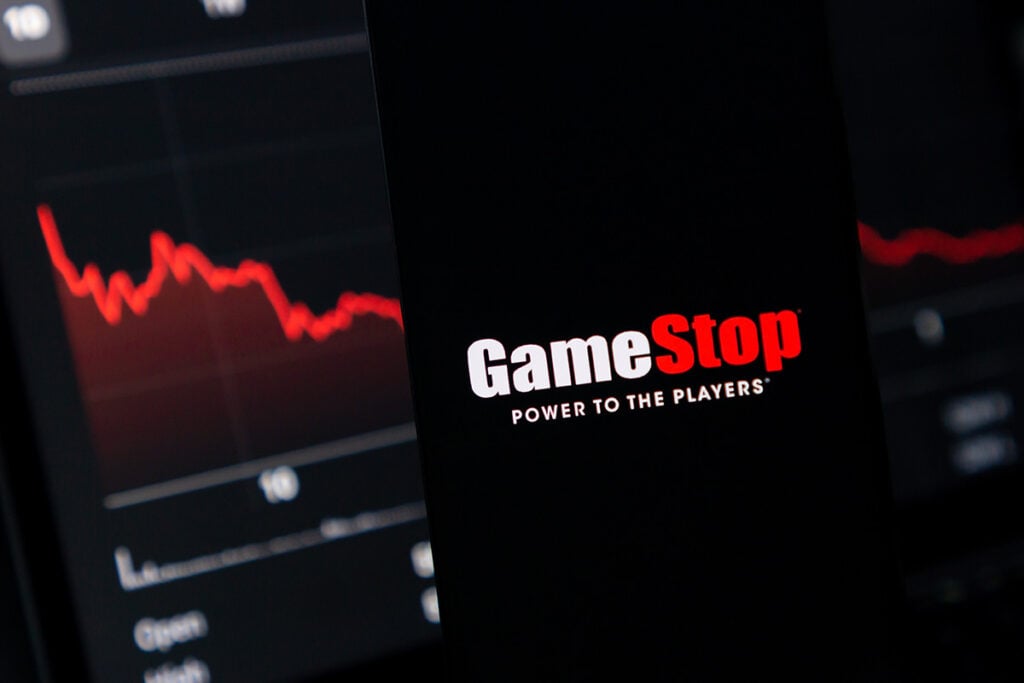TLDR
- GameStop reported profits in recent quarters but revenue continues falling, down 16.9% in Q1 2025
- Company is shifting focus from gaming to collectibles and used hardware, which now represents 28.9% of total sales
- GameStop purchased over $500 million worth of Bitcoin following MicroStrategy’s investment playbook
- Management provides minimal communication with no earnings calls since 2023 and bare-bones financial reports
- Stock remains volatile and speculative, trading at 2.4 times cash value compared to MicroStrategy’s 1.8 times Bitcoin holdings
GameStop has managed to turn profitable in recent quarters, generating nearly $45 million in net income during Q1 2025. This marks a turnaround from the $32 million loss reported in the same period last year.
However, this profitability comes at a cost. Revenue continues its downward spiral, falling 16.9% in the first quarter of fiscal 2025. The company’s sales have been declining for over a decade, a trend that predates the coronavirus pandemic.
The secret behind GameStop’s improved margins lies in a strategic pivot. The company is moving away from traditional video game retail toward collectibles and used gaming hardware. Collectibles now represent 28.9% of total sales, up from just 15.5% in the prior year.
This shift makes business sense. Physical stores offer advantages for collectible shopping that e-commerce sites struggle to match. Customers want to examine items before purchasing, making GameStop’s retail footprint a valuable asset.

The Bitcoin Gamble
GameStop has embraced MicroStrategy’s controversial investment strategy. In March, the company raised $1.3 billion through convertible senior notes specifically to purchase Bitcoin. By the end of May, GameStop had completed its first Bitcoin purchase of over $500 million.
CEO Ryan Cohen justified the move at a Bitcoin conference in Las Vegas. He cited Bitcoin’s potential as a hedge against currency devaluation and systemic risk. Cohen praised Bitcoin’s portability and instant global transferability compared to traditional assets like gold.
The strategy mirrors MicroStrategy’s approach, which has generated returns of roughly 2,970% since 2020. MicroStrategy now owns over 2.5% of all outstanding Bitcoin tokens and considers itself a Bitcoin treasury company.
Management’s Silent Approach
GameStop’s leadership has adopted an unusually secretive communication style. The company stopped holding earnings calls in 2023 and publishes minimal financial information. Their reports contain only the bare minimum required data with no management commentary.
This approach frustrates investors seeking clarity about the company’s direction. The sudden appearance of Bitcoin holdings on the balance sheet caught many by surprise. Without regular communication, shareholders must guess at management’s long-term strategy.
GameStop has also been restructuring its operations. The company completed the sale of its Canadian operations, which represented 7% of total sales in Q1 2026. Plans are underway to sell French operations as well, as all international segments currently operate at a loss.
Analysts remain skeptical about GameStop’s Bitcoin strategy. Wedbush analyst Michael Pachter assigned the stock an underperform rating, citing a “baffling” valuation gap. GameStop trades at 2.4 times its cash value, while MicroStrategy trades at 1.8 times its Bitcoin holdings.
The core retail business shows mixed signals. While profit margins have improved through the collectibles pivot, the fundamental challenge remains. Digital game downloads and streaming services continue disrupting traditional retail gaming.
GameStop’s transformation from video game retailer to collectibles store represents a practical adaptation. The company leverages its physical presence where online competitors struggle to compete. Yet questions remain about long-term sustainability.
The Bitcoin investment adds another layer of complexity. GameStop has essentially become a leveraged play on cryptocurrency prices. This strategy could amplify both gains and losses, making an already volatile stock even more unpredictable.
The company’s market capitalization remains over $13 billion despite operational challenges. This valuation reflects continued meme stock influence and speculative trading rather than fundamental business strength.
GameStop’s latest financial reports show the company purchased 4,710 Bitcoin tokens and completed multiple debt refinancing moves. The French operations sale remains in progress as part of ongoing international restructuring efforts.


